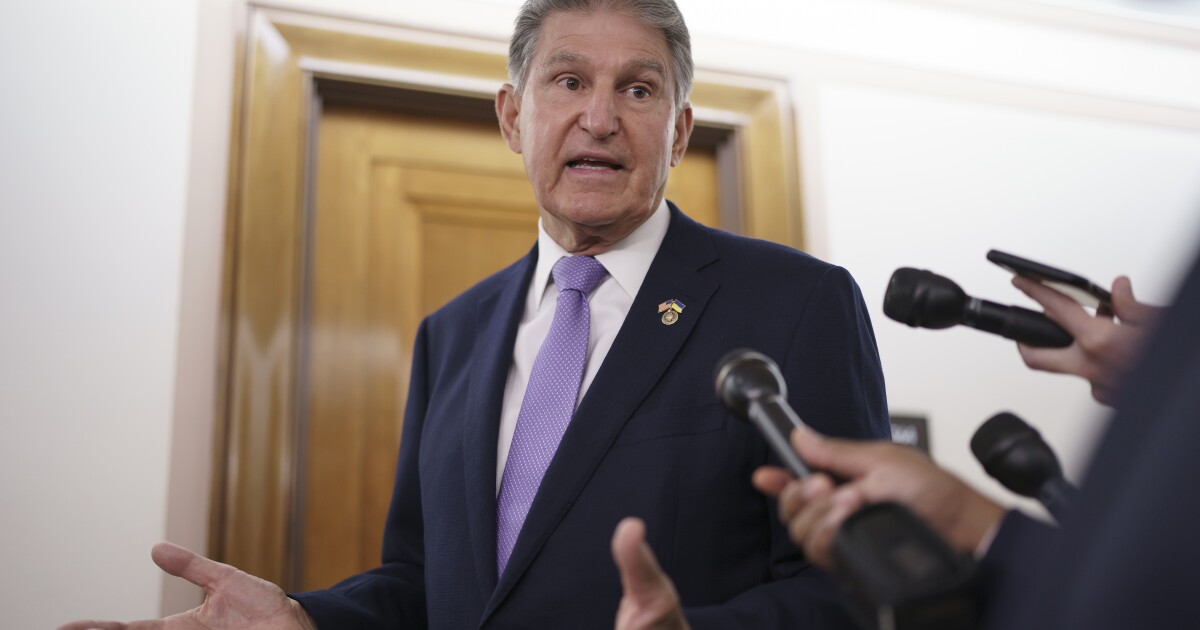Sen. Joe Manchin III and Senate Majority Leader Charles E. Schumer said Wednesday they had cut a surprise agreement on an expansive plan to reduce healthcare and energy costs, cut down on carbon emissions, fight inflation and allow Medicare to negotiate drug prices.
It marks a breakthrough on a bill that Democrats have tried for months to agree on.
The deal could give Democrats an opportunity to make progress on some of their key policy priorities ahead of the midterm election.
But it is uncertain how the plan will go over with Manchin’s fellow Democrats, many of whom have been frustrated with the West Virginian’s reluctance to embrace progressive policies and, in the view of many House Democrats, negotiate in good faith.
Democrats’ political imperative may supersede that acrimony. The agreement, which appeared to catch many on Capitol Hill by surprise, comes as Democrats close in on their August recess, after which most legislation typically stalls in an election year.
Proponents say the plan would increase cleaner energy production and reduce carbon emissions by about 40% by 2030; lower Affordable Care Act premiums for some Americans; cap out-of-pocket Medicare prescription costs at $2,000; and raise taxes on corporations and the ultra-wealthy.
The plan would raise about $739 billion by imposing a 15% minimum corporate tax and by allowing Medicare to negotiate prescription drug prices.
It would spend $369 billion on energy security and climate change policies and put $300 billion-plus toward deficit reduction, according to a summary of the plan.
Schumer released the bill text late Wednesday night and said he expects a Senate vote on it next week.
In a nod to Manchin’s interest in fighting inflation, the bill is now called the Inflation Reduction Act of 2022.
Manchin, the most conservative Democrat in the Senate, has been in a months-long back-and-forth with many members of his party over what was once a $3.5-trillion, 10-year social spending and climate bill. The original plan included included funding for progressive programs such as child care and universal prekindergarten.
Manchin said in December that he wouldn’t support such a plan. Negotiations continued on and off until about two weeks ago. At that time, talks appeared to cease as Manchin said he wouldn’t support a plan until he saw the July inflation figures.
President Biden urged Congress to pass what he called a “historic” agreement as soon as possible.
“This is the action the American people have been waiting for,” he said in a statement Wednesday. “This addresses the problems of today — high health care costs and overall inflation — as well as investments in our energy security for the future.”
The bill would be passed under a procedure that doesn’t allow for a filibuster by the Republican minority. With assumed GOP opposition, the measure would need the support of the entire Democratic caucus in the Senate and nearly all Democrats in the House.
Climate hawk Sen. Brian Schatz (D-Hawaii) said the climate provisions would include tax incentives and grants as well as investments in clean energy and transportation, energy storage and other measures.
The policies make this “a real climate bill,” he said. “The planet is on fire. Emissions reductions are the main thing. This is enormous progress. Let’s get it done.”
Senate Minority Leader Mitch McConnell (R-Ky.) had said Republicans would block passage of a separate bill to boost semiconductor manufacturing if Democrats pursued the effort. The bill passed the Senate just hours before Manchin and Schumer announced their deal.
“Democrats have already crushed American families with historic inflation,” McConnell tweeted after the agreement was announced. “Now they want to pile on giant tax hikes that will hammer workers and kill many thousands of American jobs.”
“First they killed your family’s budget,” he added. “Now they want to kill your job too.”





















Discussion about this post